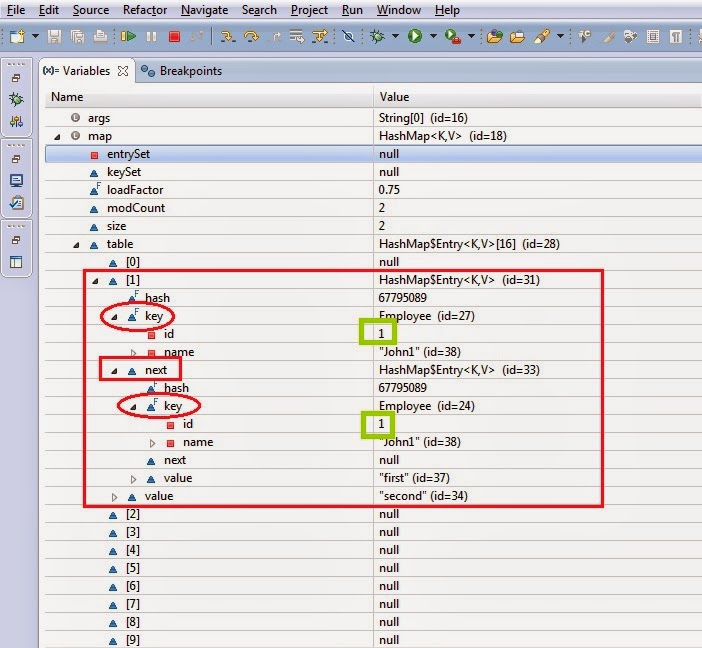
In the 1st example, I have overridden equals() only and in the 2nd one I have implemented equals() and hashCode(), see the differences. It is not required that if two objects are unequal according to the equals() method, then calling the hashCode() method on each of the two objects must produce distinct integer results.Ĭonsider the following two examples.every class in Java has class Object as its superclass.

This object class is the root of the class hierarchy in Java. During HashMapget (key) call, first a bucket is selected by mapping the key's hashCode to the bucket index, then the target entry is searched by calling equals () method on the key. Java equals () method is a method of the Java Object class. If two objects are equal according to the equals() method, then calling the hashCode method on each of the two objects must produce the same integer result. Entries, within a bucket, are arranged via Linked data structure.This integer need not remain consistent from one execution of an application to another execution of the same application. Whenever it is invoked on the same object more than once during an execution of a Java application, the hashCode method must consistently return the same integer, provided no information used in equals comparisons on the object is modified.It must be kept in mind that the object passed must be a map of the same type as the EnumMap. This is a general contractor in java programming that “whenever you override equals(), override hashcode() also”. The ( obj) in Java is used to compare the passed object with this EnumMap for the equality. Otherwise, a violation of the general contract for Object.hashCode() will occur, which results in unexpected behavior when your class is in conjunction with all hash-based collections. Those comparisons are to compare the values of id, name, age values. Overriding equals() method in the Employee Object It is good practice to override the equals() method inside the Employee class with the needed comparisons. If the equals() method returns true, replace the value with the current value.

If you override the equals(), you MUST also override hashCode(). equals() method just checks both object references are the same but not the internal field values. This ensures that the equals method works properly across different implementations of the Map.Entry interface. In case of collision, check through equals() if the keys are similar. You can override the default implementation of the equals() method defined in.

The default implementation just simply compares the memory addresses of the objects.

Returns true if the given object is also a map and the two maps represent the same mappings. If 2 objects are equal their hashcode should be equal, but if. This method is used to compare two objects. Compares the specified object with this map for equality. Returns True if the two maps contain an equal number of key and value pairs and also the key and value pair of both the maps must be same, if not returns false.HashMap Equals method has been implemented from the Map interface and overridden from Object. For equals to work, the hashcode of 2 objects which are supposed to be equal, should be same. With this map, two mappings are the same if both the key and the value are equal by. To test whether two objects are equal, a developer should provide an equals method. These methods are designed to be overridden according to their specific general contract. I know that it is not possible to extend a class which overrides the method equals() and to keep it "preserved" when someone adds a new aspect in a subclass.In Java, equals() is implemented in the Object class by default. This map is equal to another map is it represents the same set of mappings. See Java: Tips and Tricks for similar articles. Every Java object has two very important methods, i.e.


 0 kommentar(er)
0 kommentar(er)
